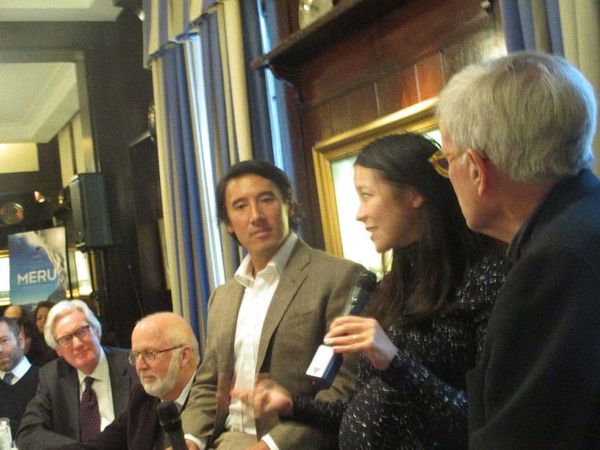 |
| Meru directors Jimmy Chin and Elizabeth Chai Vasarhelyi with Tom Brokaw Photo: Anne-Katrin Titze |
Sundance Audience Award winner and Sheffield Doc/Fest selection Meru was honored with a lunch hosted by Meredith Brokaw, Tom Brokaw, Austin Hearst and DOC NYC 2015's new Lifetime Achievement Award honoree Barbara Kopple at the 21 Club, organised by Peggy Siegal. Meru composer J. Ralph, who also worked on Orlando von Einsiedel's Oscar nominated Virunga, Bob Eisenhardt, who was also the editor of HBO's Everything Is Copy, directed by Jacob Bernstein on his mother Nora Ephron, which had its world premiere at the New York Film Festival , were at the lunch and discussion. Jean Doumanian, a producer of John Wells' wild and furious August: Osage County, documentarian Alexandra Pelosi, director/playwright Israel Horowitz, Absolute Wilson director/producer Katharina Otto-Bernstein and Wendy Ettinger, Chicken & Egg Pictures founder, were among the guests.
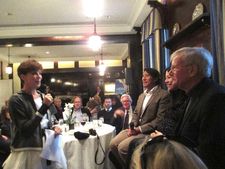 |
| Peggy Siegal introduces Tom Brokaw with Chai Vasarhelyi and Jimmy Chin Photo: Anne-Katrin Titze |
In Chin and Vasarhelyi's film, three of the world’s most accomplished mountain climbers, Conrad Anker, Renan Ozturk and Chin himself, attempt to conquer nature, outward and inward, to reach the Shark’s Fin on Mount Meru, the heretofore impossible peak in the Himalayas. The footage is breathtaking, the obstacles seem insurmountable, the trust and friendship between them has to be complete and you will find yourself cheering them on as though you were the nun in The Sound of Music, maybe not to 'climb every mountain,' but to make it to the summit of Meru with the help of a portaledge.
Peggy Siegal introduced Jimmy Chin, Chai Vasarhelyi and Tom Brokaw. Here are some of the highlights:
Peggy Siegal: Thank you all for coming to lunch with Meru. Thank you Tom Brokaw for hosting and being the moderator. Thank you Chai, thank you Jimmy. A few little things. This film is currently playing in hundreds of theaters across the country. The second highest grossing documentary of the year. I don't know what the first one is. If I did, I wouldn't tell you. It won the Audience Award at Sundance and it got 100% fresh on Rotten Tomatoes. Tom, as they say, take it away.
Tom Brokaw: To those of you for whom the two-story climb up the stairs [big laughter drowns his words] … you're in for a real treat… If this film doesn't win documentary of the year, it will be a travesty. It is an astonishing achievement in every conceivable way. The climb itself, the cinematography [by Chin and Renan Ozturk], the relationships, the storyline - it takes your breath away. Meru is the name of a mountain in India, [the source of] the Ganges river. You were climbing something called the Shark's Fin. Is it 20 or 21 thousand feet?
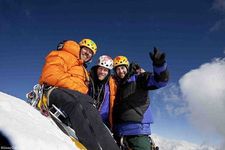 |
| Jimmy Chin, Conrad Anker and Renan Ozturk Photo: Meru team |
Jimmy Chin: 21 thousand.
TB: 21 thousand feet… It has never been climbed successfully before all the way to the summit by the greatest climbers in the world… Jimmy, describe to this audience what kind of a goal climbing Meru was as you were coming of age as a climber.
Jimmy Chin: The importance of Meru for me was actually the importance it was for Conrad [Anker]. I personally didn't have the obsession of climbing this mountain. Conrad's mentor made multiple attempts on it. Conrad's mentor, Mugs Stump was really obsessed with this peek as were a lot of other climbers. I owe so much of my career and my climbing powers to Conrad. So to climb with him was really just an honor. Of course, after the first attempt, I became obsessed with it too. And the reason being that this mountain had seen so many failures and as a climber you want to decode and figure out how to climb this thing.
Tom Brokaw: Conrad Anker, is one of the great high alpinists in the world. He's the man who found [George] Mallory [who disappeared on Mount Everest in 1924].
Chai Vasarhelyi: I will never ever be on a mountain which is probably one of the strengths of our working relationship. We definitely have a very different perspective on the filmmaking. I think that Jimmy and Renan [Ozturk] who are two of the three climbers on the journey - it just happens to be this perfect storm of a unique skill set where there are two guys in the world who can climb at that level as well as shoot at that level.
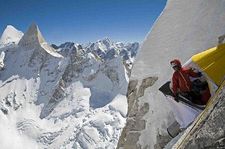 |
| Meru portaledge: "Believe it or not, we slept very well in the portaledge …" Photo: Jimmy Chin |
When I saw this footage for the first time, I just had never seen something like it. There'd been some wonderful climbing films, often it's reenactment, shot right next to the chairlift in Chamonix. What was special was they could shoot it and climb at the same time. You want to describe how you did it?
Jimmy Chin: Just to give a little context, I've been shooting expeditions for probably 15, 16 years. Really, in a climb like this, you're a climber first. I prefer expeditions that are focused on the objective and I shoot from the side. The goal is not to have the shooting hold up the climbing. It's more journalistic, it's more documentary.
Chai Vasarhelyi: Thankfully, I wasn't involved [with Jimmy, now her husband] at the time so I didn't have to live through this. But from a storytelling point of view, for me what really allows the film to transcend beyond a mountain climbing story and the mountain life outdoor genre, is the decision that despite the odds … Conrad and Jimmy understood that it was more important for them to honor the friendship that brings them together than to necessarily guarantee the success of the climb. For me that act of friendship and that comeback story… - Jimmy had to do this to live. Renan had to do this to live and live a life they chose. And Conrad honored that and they all returned back. I always come back to this act of friendship. If all of us in our lives can extend that act of friendship, we'll be better.
Tom Brokaw: But can't we do it at the bar instead…
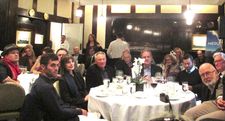 |
| 21 Club Meru lunch in New York Photo: Anne-Katrin Titze |
Chai is asked by Alexandra Pelosi how she would react when her husband [Jimmy Chin] wants to go on the mountain again. She jokes how good they have become in discussing their deepest issues in public.
Chai Vasarhelyi: We have a two-year-old already at home and this is our second child that we are expecting. Before Meru, I made five documentaries, a lot of them were political in some pretty nasty places and I took risks I knew I probably wouldn't take later, once I became a mother. Jimmy and I have a very good relationship. We have a very open dialogue. I don't think you can take the mountain out of the mountain climber.
Tom Brokaw gave me the last question to ask at the discussion during lunch.
Tom Brokaw: We have time for one more because it is New York and people do have to get back probably.
Anne-Katrin Titze: You make a brilliant choice with the first image we see. The three of you in the tent hanging up there on the mountain is a nightmare I never knew I could have. Now it will be there forever. Can you talk a little about how it feels being inside this thing that looks like a hornet's nest hanging on the mountain?
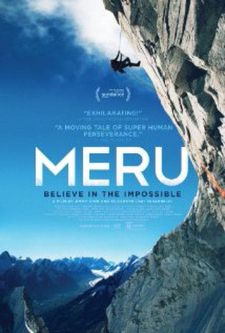 |
| Meru US poster |
Tom Brokaw: How about cocoon?
Jimmy Chin: There's a real fascination with the portaledge. In 2008 when we went up there, we went with a two-person portaledge with all our alpine gear, so we were puppy piled on top of each other. You know, even the thought of complaining was... I didn't even dare think about complaining, because I knew what Conrad would say. He'd say: "Well, the Russians would have eight climbers in here." You never complain. But really, the portaledge as terrifying as it might look, as much as a nightmare as it might seem to you, the portaledge is your safe zone.
When you got the portaledge up, when you climbed into that thing and there was a shelter around you, all of a sudden you felt like you were slightly in control. And you were warm and you were melting snow to make water and things lightened up. That's where you could actually relax. Believe it or not, we slept very well in the portaledge and we would switch every day because the warmest and most stable spot was next to the wall, the middle was the sagging one where everybody kind of slept on top of you and the outside was the coldest. So every night we rotated. So think of it differently. Think of it as a nice place!
AKT: I will. I'll try.
Chai thanks their collaborators Bob Eisenhardt and J. Ralph. She also thanks Barbara Kopple "who is one of the reasons why I make documentary films," she says, "it is such an honor that you would take the time and host this for us."
Barbara Kopple: Your film is amazing. Beautifully done, I was on the edge of my seat. Bob Eisenhardt's editing was truly remarkable. The risks that I know you took in filming - I was studying everything. But the biggest thing was what you talked about, and it was friendship. Bringing your friend along, knowing it might slow you up, knowing you might get into some kind of trouble - that was so beautiful and so humane and everybody who sees it is just there with you, hoping for you. So, thank you.
Coming up, my conversation on climbing Mount Meru, with Jimmy Chin.





















